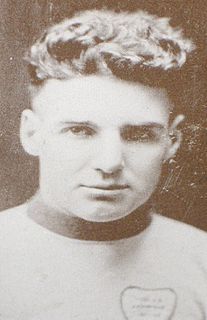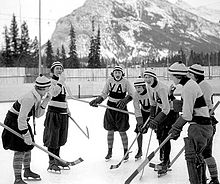
Ice hockey is a team sport played on ice skates, usually on an ice skating rink with lines and markings specific to the sport. It belongs to a family of sports called hockey. In ice hockey, two opposing teams use ice hockey sticks to control, advance and shoot a closed, vulcanized, rubber disc called a "puck" into the other team's goal. Each goal is worth one point. The team which scores the most goals is declared the winner. In a formal game, each team has six skaters on the ice at a time, barring any penalties, one of whom is the goaltender. Ice hockey is a full contact sport.
The golden goal or golden point is a rule used in association football, bandy, baseball, lacrosse, field hockey, ice hockey, floorball, goalball, and korfball to decide the winner of a match in which scores are equal at the end of normal time. It is a type of sudden death. Under this rule, the game ends when a goal or point is scored; the team that scores that goal or point during extra time is the winner. Introduced formally in 1993, though with some history before that, the rule ceased to apply to most FIFA-authorized football games in 2004. The similar silver goal supplemented the golden goal between 2002 and 2004.

Curtis Lester Patrick was a Canadian professional ice hockey player and coach associated with the Victoria Aristocrats/Cougars of the Pacific Coast Hockey Association, and the New York Rangers of the National Hockey League (NHL). Along with his brother Frank Patrick and father Joseph Patrick, he founded the Pacific Coast Hockey Association and helped develop several rules for the game of hockey. Patrick won the Stanley Cup six times as a player, coach and manager.
The Pacific Coast Hockey Association (PCHA) was a professional ice hockey league in western Canada and the western United States, which operated from 1911 to 1924 when it then merged with the Western Canada Hockey League (WCHL). The PCHA was considered to be a major league of ice hockey and was important in the development of the sport of professional ice hockey through its innovations.

The Vancouver Millionaires were a professional ice hockey team that competed in the Pacific Coast Hockey Association and the Western Canada Hockey League between 1911 and 1926. Based in Vancouver, British Columbia, they played in Denman Arena, the first artificial ice surface in Canada and the largest indoor ice rink in the world at the time it opened.

Édouard Cyrille "Newsy" Lalonde was a Canadian professional ice hockey forward in the National Hockey League (NHL) and a professional lacrosse player. Lalonde is regarded as one of hockey's and lacrosse's greatest players of the first half of the 20th century and one of Canadian sport's most colourful characters. He played for the Montreal Canadiens – considered to be the original "Flying Frenchman" – in the National Hockey Association and the NHL. He also played for the WCHL's Saskatoon Sheiks.

Cecil Henry "Babe" Dye was a Canadian professional ice hockey forward who played 11 seasons in the National Hockey League (NHL) for the Toronto St. Patricks/Maple Leafs, Hamilton Tigers, Chicago Black Hawks, and the New York Americans between 1919 and 1930. Born in Hamilton, Ontario, Dye was known as an excellent stick-handler, and goal-scorer.

Meghan Christina Agosta is a Canadian women's ice hockey forward, who last played for the Montreal Stars of the Canadian Women's Hockey League. Agosta plays for the Canada women's national ice hockey team and is a gold (3) and silver medallist at the Winter Olympics of 2006 Turin, 2010 Vancouver, 2014 Sochi, and 2018 Pyeongchang Winter Olympics. At the 2010 Winter Olympics, Agosta was named MVP of the Women's Hockey Tournament. She is a multi-medallist at the Women's World Championships with two gold medals and six silvers.
The 1922–23 Ottawa Senators season was the club's 38th season of play and sixth season in the NHL. They were coming off a disappointing playoff run in 1922, as they lost to the Toronto St. Pats in the NHL finals in a close, hard-fought series. The Senators would finish first in the standings, defeat Montreal in the playoffs, defeat Vancouver in the Stanley Cup semi-finals and defeat Edmonton to win their tenth Stanley Cup title.
The 1922 Stanley Cup Finals was contested by the National Hockey League (NHL) champion Toronto St. Patricks and the Pacific Coast Hockey Association (PCHA) champion Vancouver Millionaires. The St. Pats defeated Vancouver three games to two in the best-of-five game series to win their only Stanley Cup as the St. Pats.

The 1921–22 PCHA season was the 11th season of the professional men's ice hockey Pacific Coast Hockey Association league. Season play ran from December 5, 1921, until February 24, 1922. The season was enlarged to 24 games per team. The Seattle Metropolitans club would be regular-season PCHA champions, but would lose the play-off with Vancouver Millionaires.
The 1921–22 Toronto St. Patricks season was the fifth season of the Toronto NHL franchise, third as the St. Patricks. The St. Patricks would win the NHL championship and the Stanley Cup.
The 1924–25 Boston Bruins season was the team's first in the National Hockey League (NHL). Along with the Montreal Maroons, the Bruins were the first expansion franchise in the NHL and the league's first American-based club. The Bruins finished sixth and last in the league standings.

The men's tournament in ice hockey at the 2010 Winter Olympics was held in Vancouver, British Columbia, Canada, from February 16–28, 2010. Games were hosted at two venues – Canada Hockey Place and UBC Thunderbird Arena. These Olympics were the first to take place in a city with an NHL team since then, which meant players on the Vancouver Canucks who were competing in the Olympics were playing in their home arena: Roberto Luongo for Canada, Ryan Kesler for the United States, Pavol Demitra for Slovakia, Sami Salo for Finland, Christian Ehrhoff for Germany, and Daniel and Henrik Sedin for Sweden.

The 1982 Stanley Cup playoffs, the playoff tournament of the National Hockey League (NHL) began on April 7, after the conclusion of the 1981–82 NHL season. The playoffs concluded on May 16 with the champion New York Islanders defeating the Vancouver Canucks 3–1 to win the final series four games to none and win the Stanley Cup.

The first instances of organized women's ice hockey in Canada date back to the 1890s when it was played at the university level. The Women's Hockey Association claims that the city of Ottawa, Ontario hosted the first game in 1891. In 1920, Lady Meredith, wife of Sir Vincent Meredith of Montreal donated the Lady Meredith Cup to the Quebec Ladies' Hockey Association, said to be the first women's ice hockey trophy created for a competition in Canada. In February 1921, a women's North American championship series was played in conjunction with the Pacific Coast Hockey Association. The Vancouver Amazons from the 1920s became one of the first professional teams. They were the first women's hockey team from Vancouver to participate in the invitational women's hockey tournament sponsored by the Banff Winter Carnival. On December 16, 1922, a meeting was held to announce the formation of the Ladies Ontario Hockey Association. The Dominion Women's Amateur Hockey Association was founded in winter 1933. Lady Bessborough, the wife of Governor General of Canada Lord Bessborough donated a championship trophy.

The history of women's ice hockey in the United States can be traced back to the early 20th century. In the 1920s, the Seattle Vamps competed in various hockey tournaments. In 1916, the United States hosted an international hockey tournament in Cleveland, Ohio, that featured Canadian and American women's hockey teams.

The Fernie Swastikas were a women's hockey team that was formed in 1922 in Fernie, British Columbia. Their uniform used as a symbol the swastika, which before World War II was a common religious symbol, and especially a sun sign. In 1923, the Swastikas won the Alpine Cup at the Banff Winter Carnival women's ice hockey championship. There were two other teams called the Swastikas, one in Edmonton, Alberta, and another the Windsor Swastikas of Windsor, Nova Scotia.

The 1983 Stanley Cup playoffs, the playoff tournament of the National Hockey League (NHL) began on April 5, after the conclusion of the 1982–83 NHL season. The playoffs concluded on May 17 with the champion New York Islanders defeating the Edmonton Oilers 4–0 to win the final series four games to none and win the Stanley Cup for the fourth consecutive season.

The Penn State Women's Ice Hockey Club represents Penn State University (PSU) in Women's Division 1 of the American Collegiate Hockey Association (ACHA) and in the Central Collegiate Women's Hockey Association (CCWHA). Since the team's establishment in 2012, it has been very successful, including a pair of ACHA second-place finishes at the Division 2 level in 2012–13 and 2013–14 and an appearance at the ACHA Division 1 national championship tournament to close the 2014–15 season. PSU is one of just three teams to appear in consecutive ACHA Division 2 championship games, joining the University of Minnesota-Duluth (2007–08) and Rainy River Community College (2008–11).














